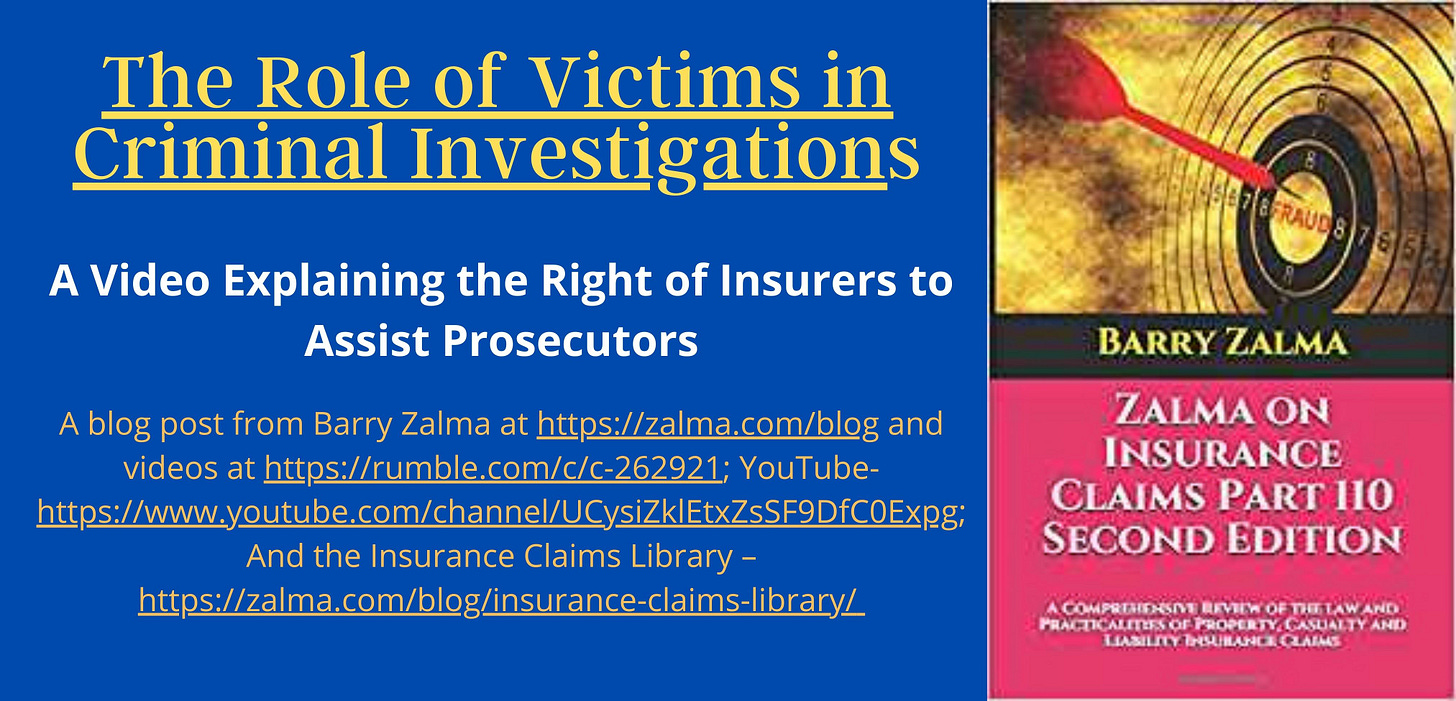A Video Explaining the Right of Insurers to Assist Prosecutors
The Role of Victims in Criminal Investigations
Read the full article at https://www.linkedin.com/pulse/role-victims-criminal-investigations-barry-zalma-esq-cfe and see the full video at https://rumble.com/vjg1wh-the-role-of-victims-in-criminal-investigations.html and at
and at https://zalma.com/blog plus more than 3800 posts.
Insurance fraud is a major component of white-collar crime. It is slowly becoming a more significant component of the law-enforcement agenda. The insurance industry plays a leading role in assisting prosecutors in the investigation and prosecution of insurance fraud. The industry has been compelled to do so by statutes enacted by most states. Insurers help prosecutors establish criminal cases involving health care providers, lawyers, bogus claimants, arsonists, and a vast array of participants in infinite number of schemes to defraud insurance companies and their customers.
Throughout the country, insurers routinely cooperate with law enforcement officials that are investigating insurance fraud by providing information, specialized expertise, and technical and administrative support for these complicated investigations. The recent federal health insurance fraud statute, and state statutes in various states, require cooperation between private insurers and law enforcement officials on fraud investigations.
A conflict exists whenever there is a reasonable possibility that the district attorney’s office may not exercise its discretionary function in an evenhanded manner. The conflict is disabling only if it is so grave as to render it unlikely that the defendant will receive fair treatment.
In the criminal justice system, the prosecutor bears responsibility for determining what crimes will be prosecuted. The legal system has traditionally allowed wide discretion to criminal prosecutors in the enforcement process. The Government retains broad discretion as to whom to prosecute.
Prosecutorial discretion is not unlimited. “Selectivity in the enforcement of criminal laws is … subject to constitutional constraints. The decision to prosecute may not be based upon an unjustifiable standard like religion, race or sexual orientation. Beyond these constitutional limitations, a trial judge “must accord a presumption of constitutionality to prosecutorial decisions and approach the inquiry with appropriate respect for the judgments exercised by officers of a coordinate branch of government.
© 2021 – Barry Zalma
Barry Zalma, Esq., CFE, now limits his practice to service as an insurance consultant specializing in insurance coverage, insurance claims handling, insurance bad faith and insurance fraud almost equally for insurers and policyholders. He also serves as an arbitrator or mediator for insurance related disputes. He practiced law in California for more than 44 years as an insurance coverage and claims handling lawyer and more than 52 years in the insurance business. He is available at http://www.zalma.com and zalma@zalma.com.
Mr. Zalma is the first recipient of the first annual Claims Magazine/ACE Legend Award.
Over the last 53 years Barry Zalma has dedicated his life to insurance, insurance claims and the need to defeat insurance fraud. He has created the following library of books and other materials to make it possible for insurers and their claims staff to become insurance claims professionals.
Go to the podcast Zalma On Insurance at https://anchor.fm/barry-zalma; Follow Mr. Zalma on Twitter at https://twitter.com/bzalma; Go to Barry Zalma videos at Rumble.com at https://rumble.com/c/c-262921; Go to Barry Zalma on YouTube- https://www.youtube.com/channel/UCysiZklEtxZsSF9DfC0Expg; Go to the Insurance Claims Library – https://zalma.com/blog/insurance-claims-library/ Read posts from Barry Zalma at https://parler.com/profile/Zalma/posts; and the last two issues of ZIFL at https://zalma.com/zalmas-insurance-fraud-letter-2/ podcast now available at https://podcasts.apple.com/us/podcast/zalma-on-insurance/id1509583809?uo=4






